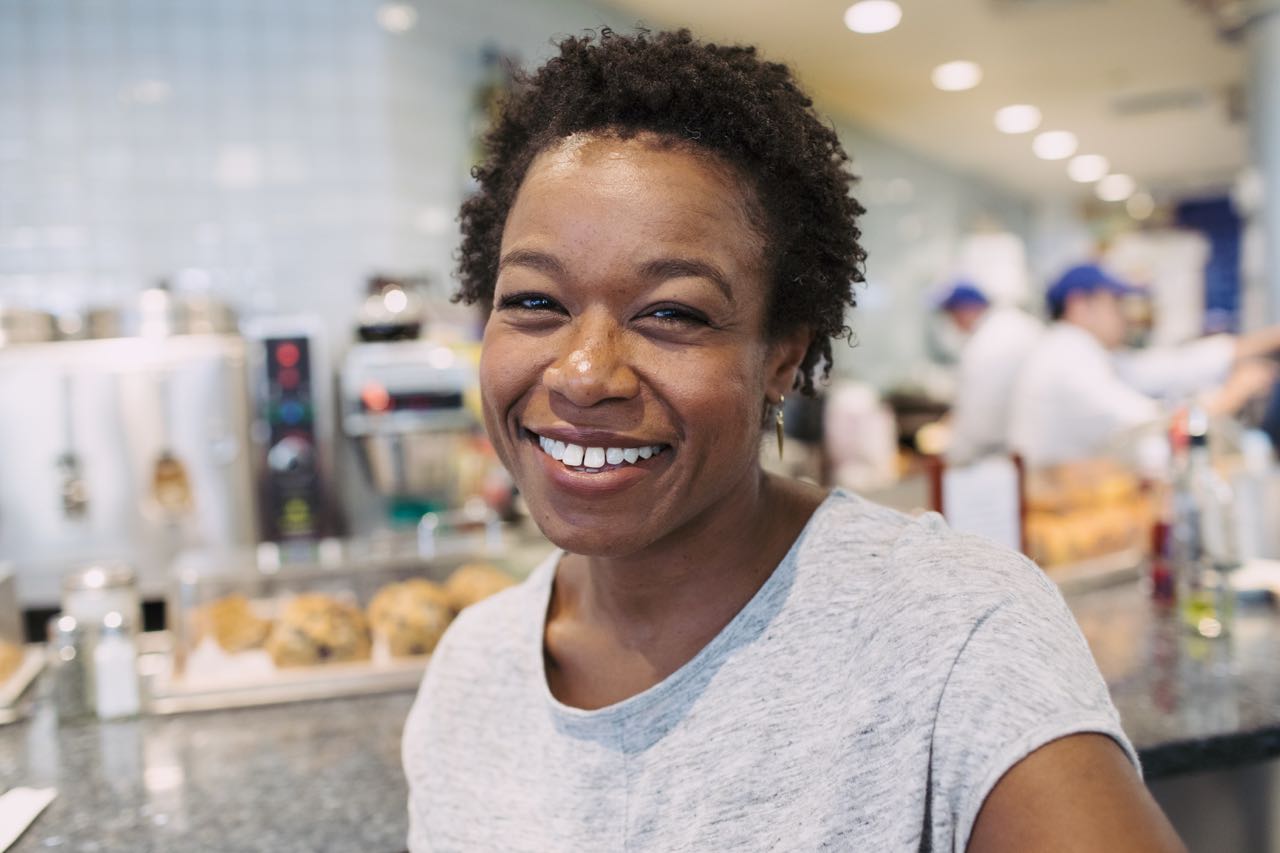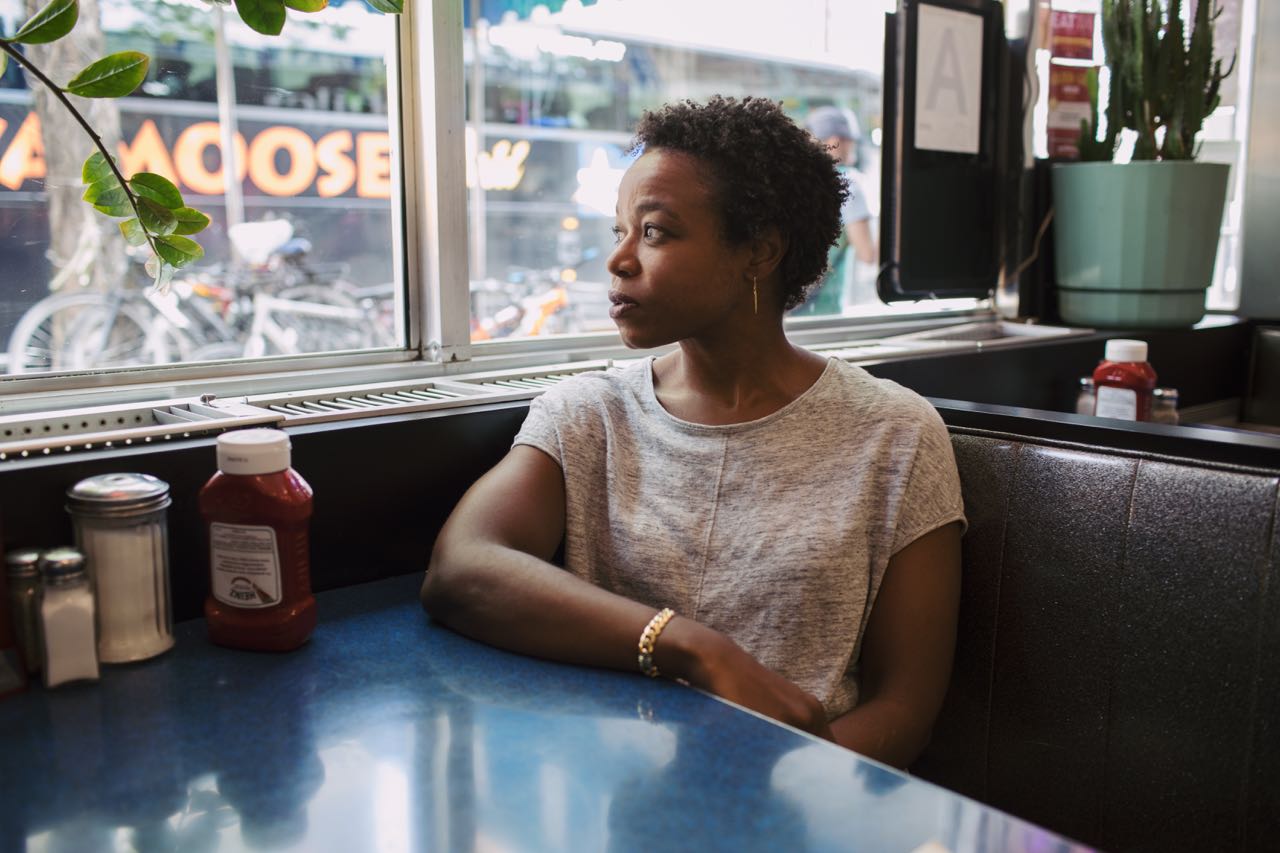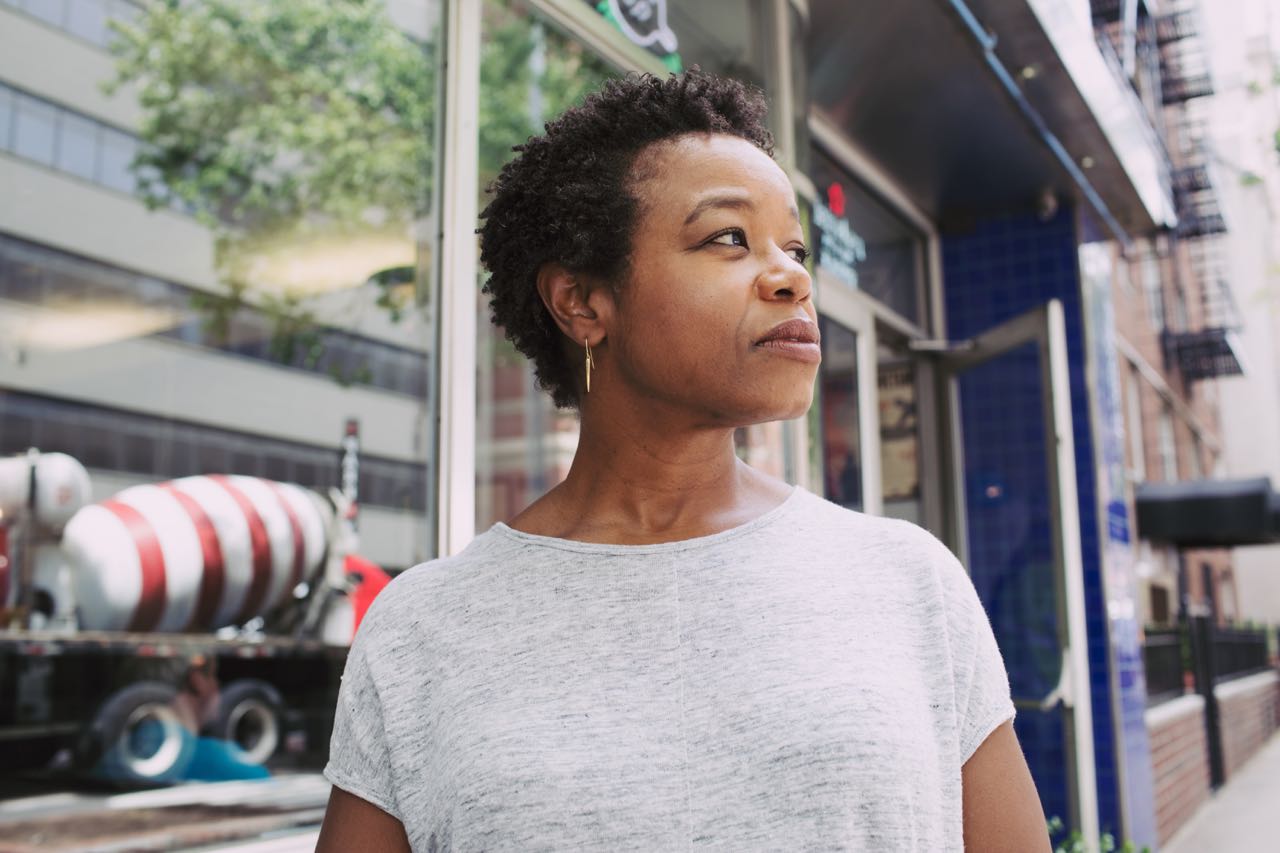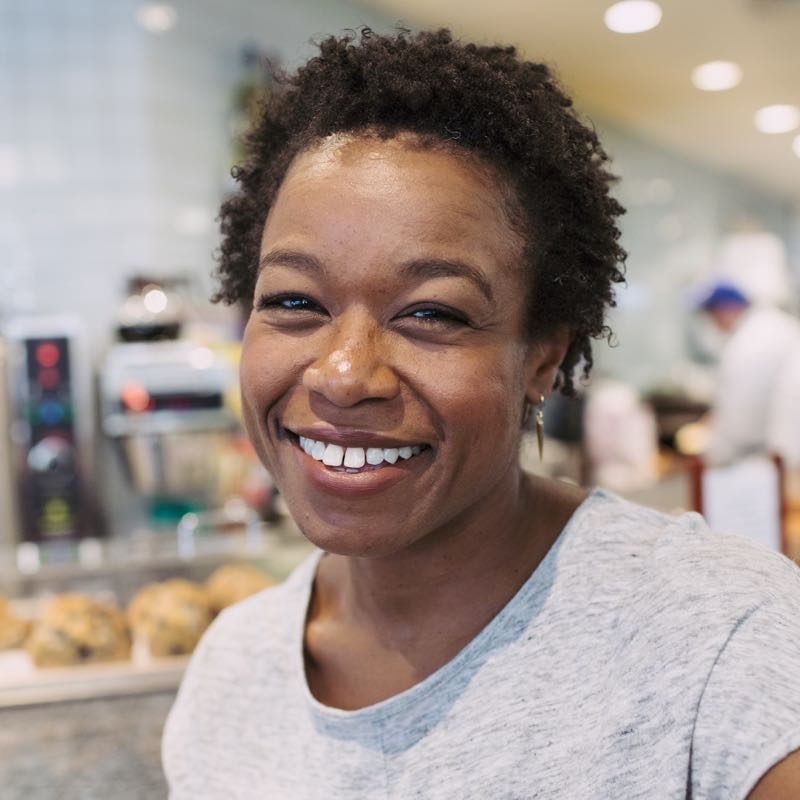An Interview with Quincy Tyler Bernstine

Written by Victoria Myers
Photography by Jacqueline Harriet
May 25th, 2017
A commonality among many of the playwrights who have been featured on The Interval is having had Quincy Tyler Bernstine appear in their plays. Quincy has made a name for herself as one of the go-to actresses of the theatre community and has delivered a wide range of insightful performances in diverse work ranging from Small Mouth Sounds to Grand Concourse to Mr. Burns to Ruined. She’s currently starring in Lynn Nottage’s Intimate Apparel, directed by Jade King Carroll at the McCarter Theatre Center in Princeton, New Jersey. As Esther, she plays a seamstress at the beginning of the 20th Century who is navigating her career, and the complicated relationships with her clientele and the men that come into her life. On her day off from performances, we sat down with Quincy to discuss Intimate Apparel and her career.
What was your entry point for the character of Esther? Do you work inside-out or outside-in?
It really depends on the role. For this, Lynn gives you everything you need on the page. So I just went with the words and took it from there. She’s written a perfect play, I think.
I know this is a play that you’ve known for a while. Did you always have an idea of how you wanted to play it or how you would play it?
I was the reader for some of the early auditions [of the original production], and I played Mayme in an earlier production, and I always had a sense of how I would want to play Esther, were I given the chance. And I think I’ve done that in my portrayal of her. Lynn is one of those writers that just gives you everything and you don’t really have to put anything on top of it. I used the map that she laid out for me. And I don’t remember the production I did in Atlanta in 2004, so it was sort of like starting from scratch. I did a reading of this play a couple of years ago, and that’s when I worked with Jade King Carroll, our director. I don’t know that the way I portrayed Esther two years ago has changed much from the way I’m portraying her now. When I first read the play—that was over a decade ago—and now I’m much older. I’ve gone through many, many experiences, some very good, some horrible, that certainly inform my work today. I think that my Esther today is much richer than she would have been had I played her five years ago.
One of the things that is so interesting about the play is that it’s a play about a woman who has a job, and so much of the story functions around that, which seems unusual.
What’s so fascinating, and one of the things that’s so incredible about this character, is that she was so successful for the time. She has $1,800 saved in her quilt, and that was worth almost $50,000. So she’s an incredible success. I think that that’s a real testament. Like she says, “I come from nothing,” and then to be as successful as she is in the play, that’s remarkable.
Another aspect of the play is that the primary relationships are various kinds of female friendships, which is, again, something we don’t always see on stage.
The relationships she has with the three women are very different. Her relationship with Mrs. Dickson, played by the wonderful Brenda Pressley, is familial, in a way. The relationship with Mayme is her home base; that’s where she goes for comfort, and so we really tried to sort of massage that and make sure that that bond was clear. Mrs. Van Buren is an interesting relationship because it is transactional, but also Mrs. Van Buren treats Esther like a chum and a confidant. And yet, as Esther says, she’s never walked through her front door. Lynn is great at this tapestry. They’re all very distinct.
And then also how race and class intersect with their friendships, too.
Absolutely. You know, Mayme has come from a higher class than Esther, she has come from a bit of privilege. So it’s interesting how Esther and Mayme come from different classes and have wound up where they have. Mrs. Dickson also is quite successful. She has this rooming house, and she sort of married into it. But Esther is a career woman at the time. She comes from slaves and has worked her way up to being this success, and that’s amazing.
And then it’s one of the male characters who ends up being not so great.
He’s not so great. You know, that’s a really hard role. And our George, played by Galen Kane, is wonderful. He’s really tried to make George as three-dimensional as possible, and I think as likable as possible. But he ends up treating Esther horribly. And of course, he has his own reasons for doing that. But it’s unfortunate because Esther, from the very beginning of the play, talks about not wanting to settle, and knowing her worth, and she believes in that so strongly—until she doesn’t. And that’s when things unravel.
Did you do any research as part of the rehearsal process?
We had a whole bookshelf of research material. The walls of the rehearsal space were covered with photographs and facts from the period. The theatre really worked very hard to make sure that we had as much information as possible. When I played Mayme, I came into rehearsal having read all these books about prostitution in New York, and that was helpful at that time. I think I read as much as I can, but ultimately I want to focus on the text.
With a period piece like this, were there any discussions in rehearsal about preconceived notions the audience might have on who these characters are, and whether that was something to take into consideration?
No, I don’t think we talked about preconceived notions. Although I guess we did, in that this play really is about nameless characters. The person you walk by on the street that you can make all sorts of judgments about them. Esther is the unidentified negro seamstress. George and Esther are the unidentified negro couple. And so this play is about shedding light on those nameless characters. We did talk about that. So I want my performance to be as truthful as I can, and make Esther as rich and real and as true as she can be. I want it to be the most honest portrayal possible.

In your career, you’ve played a lot of different roles. When you’re choosing parts, are there specific commonalities that you look for or do you always try to do something that’s different than the last role you did?
I like challenges. I’m trying to be, also, more selective the older I get. I just want roles that will challenge me and roles that are unique. I’m drawn to challenges, to put it simply.
Do you like to come into rehearsal with a lot prepared or do you like to come in and see what’s going to happen?
I lean towards the latter, where I like to figure it out in the room. I’m certainly familiar with the script, and if there’s any sort of research that needs to be done, but I’m not one that, like, comes in off book, unless it’s required. I like to figure it out in the space with the people.
You mentioned earlier wanting to be more selective about roles, which can be tough in this business. How have you learned to have agency over your career?
It’s taken awhile, but I’ve learned that there is a power in saying no. I used to say yes to everything. I can’t tell you how many readings I’ve done, how many workshops—I’m going to say thousands. There comes a point when you just can’t be everywhere all the time. I have to take care of myself, and I think that’s where the agency comes from. Because I’m starting to take care of myself more, and only do things that I know are going to bring me joy.
With the saying yes to everything, was that something that you felt like you had to do? Like a pressure?
It wasn’t a pressure necessarily, but it just seemed like the right thing to do. It seemed like the smart thing to do. And I do encourage young people when you’re starting out, to say yes to everything, because you don’t know where that yes is going to lead. But I’ve been in New York for almost two decades, and at a point that becomes like you’ll kill yourself.
Is it hard to be in a career where you feel like you don’t have as much agency as maybe—
Yes. You didn’t even need to finish the question. Yes, it is. This business, I don’t recommend it to anyone unless you have to do it—and I guess I have to do it—because we don’t have any real control.
What has surprised you the most about a career as a professional actor?
Well, I think I was surprised by the fact that I could have a career at all; I didn’t really grow up doing theatre. I kind of came into it accidentally. And so I didn’t really realize that you could be in plays for a living. So the career itself surprised me, that it existed, that it could exist for someone like me. Up until my junior year of college I thought I was going to be a lawyer. I really did sort of fall into it and just made it up as I went along.
One of the things that I ask actresses a lot is how they manage to develop as a person and as a creative person while also dealing with the industry side of things—like typecasting and people telling you, “This is how we see you, this is what you’re good at, this is what you’re not good at,” especially during those formative years of grad school.
I was very lucky, because right out of school I got a job doing Much Ado About Nothing at the Long Wharf, and from there I started working quite a bit. I started doing readings early on too, and was never really pigeonholed. I got to do a lot of different things. I think that TV and film are a little bit different, but I think in the world of theatre I’m able to do a lot of different things. So that’s a real blessing.
Do you feel like that connects back to what you were saying before, about saying yes to everything?
I do. I absolutely do. So, when you’re starting out, make sure you say yes.
In your mind, was part of that of trying to get away from being typecast, or having opportunities to do a wide variety of things?
I don’t think I was ever worried about being typecast; I just wanted to work. When I was in grad school, I was doing a play and I was getting my equity card, and it was a show with all of these professional actors who had flown in. There was this one actress, Angie Phillips, who worked all the time, and I grew to just love her and look up to her, and I said “I want a career like hers.” I said, “I just want to work all the time. I just want to go from job to job to job.” So I was really more focused on that than sort of trying to avoid being pigeonholed. And I lucked out, because people cast me in a wide variety of roles.

There have been a lot of conversations recently about fair wages on stage [Off-Broadway] and all of that. As somebody who has worked a lot in the theatre, what do you think could make it better for actors?
A living wage. It’s not much to ask. I know money is tight, but we all deserve a living wage. I’m willing to continue fighting for that.
We just did a piece recently with some actresses who were more at the beginning of their careers, and who were struggling with how to structure their lives so they had—
A life?
Yep. Was that something you have to learn to balance? Especially if you’re always working.
I have had to make myself take breaks, and I’m in a relationship now so there’s more to life than my work. And that was not always the case for me. My life was my work for many, many years. And as I get older, I’ve learned that my work benefits from having more of a life. It’s not the end of the world if I don’t do X, Y, and Z reading. If I need to go visit my family, that’s just as important. And again, it makes the work better. There was a time when I was constantly working. So, externally, I was always doing a reading or a workshop or I was in rehearsal for a show. And internally, my reason for getting up in the morning was to work on a play. And now I get up for many more reasons beyond that. But it’s a passion. I am doing it because I love to do it. I genuinely love acting. It brings me such joy, I wake up every day grateful that I get to do what I love.
Do you have a spiritual life and does that affect your work?
I would call myself a spiritual person. I was raised Catholic. I’m not practicing, but I do believe in a higher power and I have my angels that are with me all the time, onstage and off. Theatre is my church. It’s a cliché, but it’s true.
What do you think is something the theatre industry can do to make things more equal for women?
Do more plays by women. Include more female directors. I think that’s where it starts. And we’re getting there, but we still have a long way to go. But I think the answer is in encouraging talent—writers and directors in particular.

